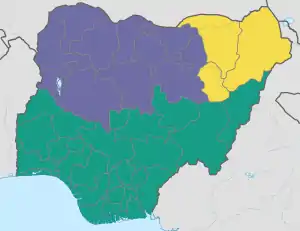Sharia in Nigeria
In Nigeria, Sharia has been instituted as a main body of civil and criminal law in twelve Muslim-majority states since 1999, when then-Zamfara State governor Ahmad Sani Yerima[1] began the push for the institution of Sharia at the state level of government.

States
Twelve out of Nigeria's thirty-six states have Islam as the dominant religion. In 1999, those states chose to have Sharia courts as well as Customary courts.[2]
As of 2012, the following 12 states have instituted Sharia:
- Zamfara State (27 January 2000)
- Kano State (21 June 2000)
- Sokoto State
- Katsina State
- Bauchi State (June 2001)
- Borno State
- Jigawa State
- Kebbi State
- Yobe State
- Kaduna State
- Niger State (4 May 2000)
- Gombe State
Blasphemy
Blasphemy is a criminal offence in both the Nigerian civil law and shari'a law
Execution(s)
In 2002, the first execution of a man convicted under Sharia laws took place in Katsina State. The man was hanged after pleading guilty to murdering a woman and her two children [3]
Homosexuality
Homosexuality is a criminal offence in both the civil and shari'a law. The two most common religions Islam and Christianity as well as the traditions of the people forbade homosexuality.
In 2014, homosexual men were targeted by Hisbah, the religious police.[4] In Nigeria, federal law criminalizes homosexual behaviour, but states with Sharia law impose stiffer punishments.[5]
Sharia Court of Appeals
Recognized as a federal court of appeals under the government of Nigeria, the Sharia Court of Appeals is the most controversial of the judicial system. It exists within the Federal Capital Territory of Nigeria and is a part of the Unified Courts System. The Sharia Court of Appeals reviews cases involving Sharia law, particularly in the North and Northeast regions of the country. This has caused controversy because while the Sharia Court of Appeals interprets and reviews cases relating to Islamic law, they must also interpret the common and customary laws of the other regions of Nigeria.[6]
Controversy
Some argue that as implemented in the north, Sharia violates the Constitution of Nigeria.[7]
Status
Sharia used to be categorized as a customary law in Nigeria.[8][9] This position has changed given the judicial pronouncement in the case of Alkamawa V Bello(1998) LPELR-SC.293/1991[10] Hence, Sharia is now seen as a distinct and universal legal system.
Riots
There have been numerous riots over the implementation of Sharia, primarily involving non-Muslim minorities in the states that implemented the system. One such riot led to the death over 100 people in October 2001 in Kano State.[11][12]
Amina Lawal
In 2002, negative light was brought to Sharia in northern Nigeria when Amina Lawal, a single mother in Katsina State, was accused of adultery and sentenced to death by stoning by a state Sharia court for conceiving a child out of wedlock; the father was released without conviction for lack of evidence. Lawal's conviction provoked outrage both in southern Nigeria and the West, with many national and international NGOs lobbying the federal government to overturn her conviction. In 2004, the conviction was overturned by the Sharia court of appeal, and Lawal returned to private life.[13]
Safiya Hussaini
References
- Nigeria Sharia architect defends law, BBC News, 21 March 2002
- "Nigeria: International Religious Freedom Report 2008". U.S. Department of State. 2008. Retrieved 2 August 2009.
- Nigeria: First Execution under Sharia Condemned, Human Rights Watch, 8 January 2002
- Ross, Will (6 February 2014). "Nigerian gay men being hunted down". Retrieved 11 April 2019.
- Bearak, Cameron. "Here are the 10 countries where homosexuality may be punished by death". The Washington Post. Retrieved 11 April 2019.
- "GUIDE TO NIGERIAN LEGAL INFORMATION - GlobaLex".
- In Nigeria, Many Girls Are Married And Divorced Before Adulthood. Voice of America, 29 June 2014.
- Oba, A.A (2002). "Islamic Law as Customary Law: The Changing Perspective in Nigeria". The International and Comparative Law Quarterly. 51 (4): 817–850. doi:10.1093/iclq/51.4.817. JSTOR 3663189.
- "SHARIA DEVELOPMENT IN NIGERIA" (PDF). Retrieved 8 September 2018.
- "ALHAJI ILA ALKAMAWA v. ALHAJI HASSAN BELLO & ANOR". LawPavillion. Retrieved 8 September 2018.
- Obasanjo Assesses Riot Damage in Kano - 2001-10-16. Voice of America News.
- "Kano: Nigeria's ancient city-state". BBC News. 20 May 2004. Retrieved 12 July 2007.
- Koinange, Jeff. "Woman sentenced to stoning freed". CNN. Retrieved 30 September 2014.